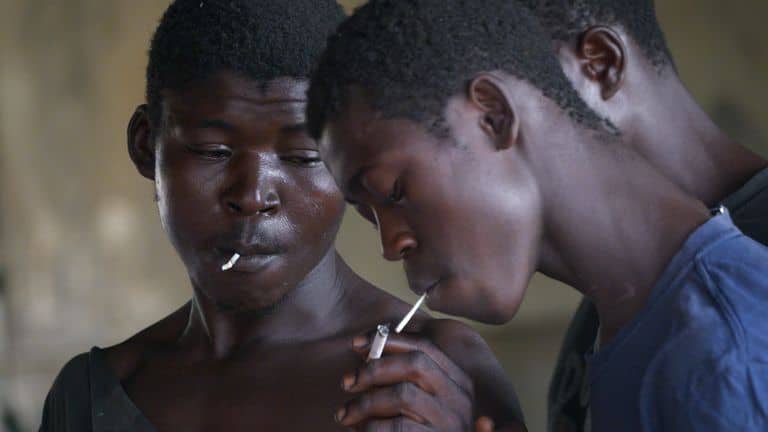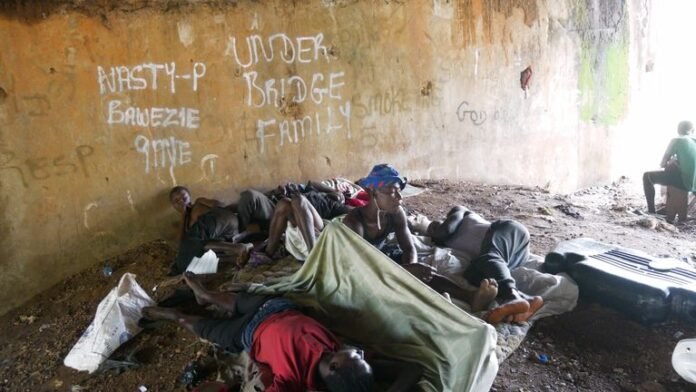By Mahmud Tim Kargbo
Ibrahim, a 23-year-old from Wellington in Freetown, once dreamt of completing university, starting a small business, and providing for his family. His ambitions mirrored those of countless young Sierra Leoneans. Yet those dreams gradually evaporated as he sank into addiction to Kush. Friends watched helplessly as he descended into lethargy, hallucinations, and despair. Neighbours whispered about his erratic behaviour, but no one intervened. When his parents finally sought help, it was almost too late. Ibrahim has become a cautionary tale, a symbol of what happens when a society fails to protect its youth from the scourge of deadly substances.
Ibrahim’s story is far from unique. Across Sierra Leone, from the bustling streets of Freetown to the suburbs of Bo, Kenema, Port Loko, Kono and Makeni, young men and women are being consumed by Kush. It is a national emergency that threatens every family and strikes at the very foundation of Sierra Leone’s future. But as the human tragedy deepens, a troubling question arises: is this crisis simply a public health and social challenge, or does it reveal deeper systemic failures, perhaps even malicious designs to erode the nation’s human capital?

The National Dilemma
Many may dismiss suspicions of a hidden agenda as paranoia. Yet the continued prevalence of Kush, despite government declarations and pledges to eradicate it, raises serious questions. If hundreds of young people like Ibrahim are falling victim while a national emergency has supposedly been declared, the public has every right to ask whether the government is truly committed to ending the crisis or merely engaging in political rhetoric.
Under the leadership of President Julius Maada Bio, the government declared a national emergency on drug and substance abuse. However, implementation has been inconsistent, underfunded, and largely symbolic. According to the World Health Organisation, while awareness campaigns and rehabilitation centres exist, most remain under-resourced, leaving countless addicts without access to meaningful treatment or support.
Words and declarations alone will not suffice. Only decisive action, backed by adequate funding, effective enforcement, provide social service facilities to the suffering majority and genuine political will, can protect Sierra Leone’s youth and secure the nation’s future.
Importation, Complicity and the Role of Security Agencies
Intelligence reports from the Sierra Leone Police and other credible sources confirm that Kush’s chemical components are not locally produced but imported for processing within the country. This revelation raises uncomfortable yet crucial questions. How do these chemicals enter Sierra Leone without detection by customs, border security and other security agencies ? Are the authorities merely negligent, or are some officials complicit in this slow-moving national catastrophe?
If corruption and bribery are factors, as many citizens suspect, then the very institutions responsible for national protection have been compromised. In such circumstances, can Sierra Leoneans truly feel safe when those charged with defending their nation may be aiding its destruction?
Beyond Politics: A Human Resource Crisis
The battle against Kush must rise above politics. It is not a partisan issue but a national imperative. Yet some members of the SLPP and APC continue to weaponise the crisis to score political points, displaying a dangerous immaturity at a time when unity is most needed. While the nation’s youth perish, politicians trade accusations and counter accusations. That is not leadership; it is abdication of duty.
Sierra Leone’s Constitution makes the duty of government unmistakably clear. Sections 5(2)(b) and 13(b) state that the security, welfare, and prosperity of the people shall be the primary purpose of government, and that every citizen must protect and preserve public property and defend the nation. This duty extends to all citizens, regardless of age. Even when adults choose self-destructive paths, the government remains obliged to safeguard their lives through enforcement, education, and rehabilitation.
The Role of Parents and Communities
The state cannot win this battle alone. Families and communities must form the first line of defence. Parents must pay closer attention to their children’s behaviour, and communities must be vigilant in reporting dealers, monitoring suspicious activity, and fostering a culture that rejects drug use.
Schools, religious institutions, and civil society organisations must continue their work in prevention and rehabilitation. As the old adage reminds us, prevention is far better than cure. When family, moral guidance, and community vigilance are neglected, addiction takes root. The Kush crisis is not merely political; it is societal. If Sierra Leoneans stand united in purpose, they can still protect their youth and reverse this devastating tide.
Commendable Examples of Leadership
Despite widespread political bickering, a few leaders have displayed courage and principle. SLPP’s former Secretary General and current Deputy Minister of Mineral Resources, Umaru Napoleon Koroma, has consistently urged young people to reject Kush while calling on parents and community leaders to take responsibility for prevention.
Sidie Mohamed Tunis, Member of Parliament and former Speaker of the ECOWAS Parliament, has also pledged strong support for anti-drug initiatives, insisting that the fight against Kush must remain non-political. He criticised efforts to discourage public cooperation, reminding his peers that national survival transcends party allegiance.
On the opposition benche, APC’s Abdul Kargbo has raised the issue in Parliament with commendable persistence. His insistence that the government must uphold its constitutional duty to protect citizens and secure national borders prompted the Speaker’s acknowledgment of state responsibility. Such examples prove that principled leadership can exist across political divides.
The Constitutional and Moral Obligation
The Constitution of Sierra Leone leaves no ambiguity: the state must protect life, property, and the welfare of its citizens. Failure to act decisively against Kush represents not only a governance failure but a constitutional breach.
Some argue that individuals must bear personal responsibility for their actions. Yet personal accountability cannot excuse state inaction in the face of a national health emergency. Government responsibility extends to preventing harm and protecting life, regardless of the victim’s age. Eradicating Kush therefore demands a comprehensive strategy of law enforcement, education, and rehabilitation.
Political Immaturity and the Price of Inaction
The continuing partisan squabbles between some SLPP and APC politicians reveal a worrying detachment from reality. While rulers argue, young Sierra Leoneans die. This political immaturity carries a profound national cost. Every day lost to political wrangling means another day in which the nation’s future workforce is destroyed.
Leadership in a time of crisis requires vision, empathy, and sacrifice. Those who prioritise political gain over the survival of the nation are failing the very people they claim to serve.
A United Front Against Kush
The only viable solution is unity. Parents, teachers, religious leaders, community elders, and political actors must rise above partisan interests and act collectively. The fight against Kush is not an SLPP matter or an APC cause; it is a Sierra Leonean imperative.
Communities must remain vigilant, report dealers, and support recovery efforts. Parents must educate themselves about the dangers of Kush and intervene early when signs of addiction appear. Government must reinforce border control, empower anti-drug agencies, and provide adequate funding for rehabilitation centres. Only a combined, multi-layered approach can succeed.
The Urgency of Action
Time is running out. Each day lost allows more young Sierra Leoneans to fall victim. Their absence weakens the nation’s social and economic fabric. The Truth and Reconciliation Commission once warned that neglect, impunity, and moral decay undermine peace and development. The Kush epidemic stands as a painful testament to that warning.
This is not a crisis that can be deferred or politicised. It is an existential threat that demands immediate and unified national action.
The Call to Leadership
True leadership is measured not by political victories but by moral courage in moments of crisis. Honourables Umaru Napoleon Koroma, Sidie Mohamed Tunis, and Abdul Kargbo have shown that collaboration is possible even amid political division. Their actions prove that unity can triumph over partisanship when the nation’s survival is at stake.
The Speaker of Parliament also merits commendation for his maturity in managing parliamentary debates on the crisis, demonstrating that statesmanship still has a place in Sierra Leonean politics.
A National Duty
The fight against Kush is more than a policy challenge; it is a moral, constitutional, and national duty. Sierra Leone’s leaders, parents, and communities must rise to this responsibility. The government must uphold its constitutional obligations, allocate resources, and enforce the law with determination.
Ibrahim’s story is a tragic reminder of what is at stake. If action is delayed, Sierra Leone risks losing an entire generation, the future teachers, doctors, engineers, and leaders who could build the nation anew.
The time to act is now. Let this be the cause that unites the nation, not divides it. Let Sierra Leone’s leaders, families, and citizens choose courage over complacency and unity over division. Only then can the country reclaim its youth, protect its human resources, and secure a future free from the shadow of Kush.
When will Sierra Leone finally put the nation first?








